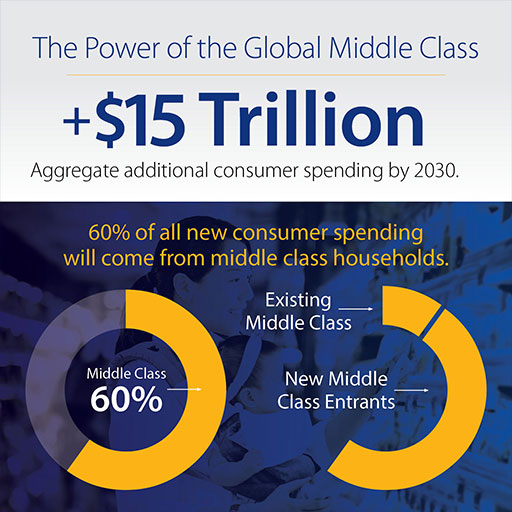Few forces in the global economy pack a bigger punch than the growing middle class, and now it’s growing faster than ever. The transformation of living standards around the world is helping hundreds of millions of new consumers join the urban middle class, unleashing an economic force that is reshaping the planet.
Global middle class consumption study
Visa economists Wayne Best and Richard Lung discuss the findings of the new study.


Over the next decade, more than half of the growth in global consumption is expected to come from the middle class—most of which will be new entrants to the middle class. Hundreds of millions more consumers will have purchasing power that extends beyond their basic needs. As their incomes grow, family budgets will also shift as they add new amenities to their middle class lifestyle (such as apparel and restaurant spending), or aspire to purchase global brands for the first time.
Visa’s new study looks at these and other trends in global consumption, including a comparison of globalization level for cities and countries around the world. One key metric of globalization is the size of a city’s middle class, because a vibrant middle class and urban affluence create larger and stronger markets. As less globalized cities close their “globalization gap” with highly globalized cities, new international business opportunities are likely to emerge.
The study explores the tremendous changes that are occurring in the geography of urban consumption, including the convergence of technology and living standards that have brought consumers from around the world closer together. Using “big data,” the study identifies how urban centers and the consumers that live in them could be impacted by ongoing demographic and technology trends. Understanding these trends, will enable companies to better plan and forecast for business growth.
Did You Know?
- The rapidly expanding middle class will account for 60% of the $15 trillion* in additional consumer spending expected between now and 2030.
- Projected growth in aggregate consumer spending will add the equivalent of a second United States to the world economy by 2030.*
- Cities like Shanghai and St. Petersburg have become as important to the global economy as Berlin, Montreal, Tokyo or Austin.
* Based on 22 countries and 103 cities included in the study.

Disclaimer
Case studies, statistics, research and recommendations are provided "AS IS" and intended for informational purposes only and should not be relied upon for operational, marketing, legal, technical, tax, financial or other advice. You should consult with your legal counsel to determine what laws and regulations may apply to your circumstances. The actual costs, savings and benefits of any recommendations or programs may vary based upon your specific business needs and program requirements. By their nature, recommendations are not guarantees of future performance or results and are subject to risks, uncertainties and assumptions that are difficult to predict or quantify. Visa is not responsible for your use of the information contained herein (including errors, omissions, inaccuracy or non-timeliness of any kind) or any assumptions or conclusions you might draw from its use. Visa makes no warranty, express or implied, and explicitly disclaims the warranties of merchantability and fitness for a particular purpose, any warranty o non-infringement of any third party's intellectual property rights. To the extent permitted by applicable law, Visa shall not be liable to a client or any third party for any damages under any theory of law, including, without limitation, any special, consequential, incidental or punitive damages, nor any damages for loss of business profits, business interruption, loss of business information, or other monetary loss, even if advised of the possibility of such damages.
All brand names and logos are the property of their respective owners, are used for identification purposes only.